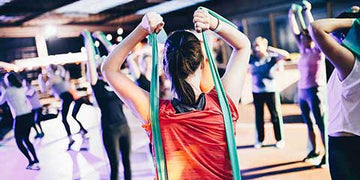by Anthony Benjamin on Oct 12, 2022

Physical Activity after Bariatric Surgery
Congratulations on choosing bariatric or another weight loss surgery as a start to a healthier life! As you embark on your new journey, we’d like to share some tips to help you get active and safely exercise after bariatric surgery. Physical activity is recommended as part of a healthier lifestyle; understanding how to get the best results and stay on track is important to feeling your best.
“When Can I Start Exercising?”
 This is one of the most
common questions from patients, especially those who have started exercising to lose weight
before surgery. The American Society for Metabolic and Bariatric Surgery encourages patients
to start light exercise as soon as possible after surgery – that includes while still in the
hospital.
This is one of the most
common questions from patients, especially those who have started exercising to lose weight
before surgery. The American Society for Metabolic and Bariatric Surgery encourages patients
to start light exercise as soon as possible after surgery – that includes while still in the
hospital.
Movement encourages healing; this makes recovery faster. Slow walks through the hospital hallways are encouraged to get your blood flowing and inspire regular bodily functions that are critical to feeling your best.
Don’t worry, it’s normal for walks to be uncomfortable at first, but hang in there – they will get easier each time. Ask loved ones to walk with you and inspire you to take extra steps each day. Walking with a partner is more fun and motivating.
Benefits of Exercise after Weight Loss Surgery
 It’s no secret that
structured exercise like 20 to 30 minutes a day of walking, bike riding, exercise class, or
yoga mixed with regular daily activities like gardening, walking the dog, and playing with
your kids, is extremely beneficial.
It’s no secret that
structured exercise like 20 to 30 minutes a day of walking, bike riding, exercise class, or
yoga mixed with regular daily activities like gardening, walking the dog, and playing with
your kids, is extremely beneficial.
Sometimes after Bariatric or other weight loss surgery, it’s tough to get motivated. You feel as though the surgery should be enough to lose the excess weight and it can be uncomfortable at first. However, the benefits go far beyond just losing weight.
The most important thing is doing what you can and work to increase activity slowly and safely. Once you start moving more, you’ll feel better. And when you feel better, you’ll feel like moving more. It’s a win-win! You’ve probably heard it before, but increasing your fitness level will:
- Assist with losing weight and maintaining that loss
- Boost metabolism
- Build bone density
- Increase energy levels
- Promote better circulation
- Lower blood pressure
- Provide pain relief
- Heighten immunity
- Lubricate joints
- Improve mood
- Offer stress relief
- Encourage quality sleep
- Clearer mind and better focus
- Decrease risk of chronic diseases
- And so much more!
It’s important to note that you will want to check with your bariatric surgeon before starting and/or changing your physical activity routine.
Safe Exercise & Enjoyable Activities Post-Surgery
 One of the best ways to
get moving after bariatric surgery is to find activities that you enjoy. Do you love being
outside? Taking regular walks in nature burns calories, builds strength, boosts Vitamin D
from the sun’s rays (even on cloudy days), relieves stress, and releases feel-good hormones.
One of the best ways to
get moving after bariatric surgery is to find activities that you enjoy. Do you love being
outside? Taking regular walks in nature burns calories, builds strength, boosts Vitamin D
from the sun’s rays (even on cloudy days), relieves stress, and releases feel-good hormones.
You may have to force yourself to exercise at first, but we find most patients grow to like it and some eventually love it; they look forward to their “me time” and enjoy the undeniable benefits it provides.
Some Exercise Options and Modifications:
Walking: if walking outside or on a treadmill is hard, walk in a pool. The addition of water is easier on joints and lessens sweating. Or, take short walks around your neighborhood until you can add distance, and eventually, walk those small hills to get your heart rate up.
Riding a bike: you can start by riding a recumbent bike (sitting back with feet out front) a few minutes a day, in the gym or at home, then graduate to a regular indoor or outdoor bike. Gradually increase your time, even if it’s a minute per day, and before you know it, you’ll be riding 20-30 minutes each time.
Dancing: those who enjoy dancing don’t feel as though it’s exercise. There are many choices from low-impact to high-energy dance-style classes available at your local gym (like Zumba) and plenty of YouTube videos, DVDs, and Apps that can be enjoyed in the comfort of your own home.
Exercise with friends: ask your friends what they like to do for activity and if they would be willing to share those things with you or maybe try something new with you. Plus, having an accountability partner for your new lifestyle before and after your bariatric surgery – especially when it comes to eating, activity, and emotional support – can help make your fitness plan and post-surgical health routine a success.
Make it fun! Whatever you decide to do for exercise and physical activity, have fun with it. Being active with loved ones or using it as “me time” means you’ll look forward to it, thereby sticking with it, and ultimately – loving it!
How to Create a Post-Surgery Exercise Strategy
 Make an appointment! One way to be sure you
fit exercise into your very busy life is to schedule it. It may take some trial and error to
discover what time of day is best for you or what works with your work schedule, but
nonetheless, planning will increase your odds of doing it and having it become routine.
Make an appointment! One way to be sure you
fit exercise into your very busy life is to schedule it. It may take some trial and error to
discover what time of day is best for you or what works with your work schedule, but
nonetheless, planning will increase your odds of doing it and having it become routine.
One caveat to scheduling – you must treat your fitness time as an actual appointment that can’t be canceled unless there’s an emergency; just as you would a doctor’s appointment or a work meeting. Creating new habits takes discipline and repetitiveness. Our bodies like comfortable, familiar routines (change is hard!). But, by scheduling and following through with your activity, your body will adapt to your new behavior, come to enjoy it and, eventually, depend on it.
Start Slow. If creating a schedule sounds too strict or if you’ve never been physically active before, start slow. Plan five to ten minutes a day, two days a week at first, and then increase once you’re comfortable with that schedule.
Avoid this pitfall – starting too fast and overdoing it right from the start. You’ll end up hating it or being too sore and stop. The goal is to make physical activity a positive part of your day so you stick with it for a healthier, happier life.
A Guide to Conquer Barriers to Success
We know you’ve heard them before (and have probably used them) – those common excuses as to why you can’t exercise or find time for yourself.
- Not enough time in the day
- Too many after school activities
- I can’t afford a gym membership
- My job is too demanding
- Exercise is too hard or boring
Everyone is overwhelmingly busy these days. There’s a constant stream of stimulus – work, kids, family, medical issues to manage, taking care of the home, the pets, keeping up with social media, binge watching shows … can you see where a few of these can be done simultaneously?
How about walking the dog while you walk yourself? Ride bikes with the kids after school. Watch your favorite show while you walk on the treadmill or ride your indoor bike. Keep in mind that physical activity can even be done in ten-minute increments throughout the day.
Make a list of barriers and how to overcome them. If you make a list of barriers, you can see exactly what they are; then write next to those barriers what you plan to do to overcome them. This way, you create your own guide to becoming fit and it feels less like someone telling you what to do.
One solution for many barriers is to have fitness accessories at home, so in a pinch, you can sneak in 10-20 minutes here and there throughout your busy day.
How to Workout at Home
If you don’t have time or the extra funds for a gym membership, there are lots of ways to get an inexpensive, good workout at home.
Things to have on hand for your home fitness options:
- Yoga mat – makes floor work more comfortable and gives you a dedicated space for all types of yoga, stretching, and things like legs lifts, knee push-ups, sit ups, etc.
- Resistance bands – these are a must-have. If you research online, you’ll see hundreds of strength training and stretching activities for all levels.
- Soccer ball or weighted ball – adds resistance when doing squats, which work the inner thigh muscles and strengthen the knees.
- A Bosu ball – another great all-around fitness gadget. Take a look online at all you can do with a Bosu. Just standing on it works your core. If you can’t balance right away, that’s okay. Use one hand on the back of a chair or the wall to assist.
- Good athletic shoes – keeping your feet healthy no matter what activity you choose is imperative to feeling good.
- A few good DVDs, Apps, or YouTube videos to help guide you if you’re unsure what to do. Just be sure to start with workouts for beginners and work your way up.
- A pedometer or use one of the fitness apps – this helps you track your progress and celebrate the wins!
Consistency is the Key to Bariatric Success
In order to make your bariatric surgery a life-long success and get into a routine that your body responds to and loves, consistency is #1. Consistently eating the right foods, getting the proper rest, and getting your exercise will help you stay healthy for life.
As for physical activity and fitness, you can work up to quality and length of time, but doing something every day – even for a few minutes – is going to keep you heading in the right direction and make your weight loss and healthy lifestyle a success.
Remember, there are all sorts of last-minute crisis and responsibilities that will try to derail your fitness efforts. If you can get any amount of physical activity in, even 10 minutes, you will feel better about yourself. It’s better to do the bare minimum than to skip it – it’s hard to get back into your physical activity regimen once you are out of the habit.
Tracking Fitness Success
This may seem frivolous, but when you track your fitness level, you will see just how strong you are becoming and it will make you feel empowered. We all know how to track weight loss (inches, pounds, pictures, clothes, BMI) – but how do you track your fitness?
Keeping notes is the best way, as well as tracking your body mass index (divide your weight in pounds by your height in inches squared, then multiply by 703, or buy scales that tells you). A few things to note:
- Do you have more energy?
- Are you sleeping better?
- Do you feel less stressed?
- Are you breathing easier (less winded)?
- Have you changed the way you handle stressful situations?
- Do your clothes fit differently?
- Notice less pain and inflammation?
Start before surgery (if you’re reading this before) by writing down how you feel throughout the day, both mentally and physically. As you begin your physical activity plan, be sure to also write what activities you do each day. About once a month, go back over your notes and make a list of the changes you have noticed. Seeing the positive effects on paper makes it more “real” and encourages you to continue.
You Can Be Physically Active & Fit
 We hope this guide to
being physically active and getting exercise after bariatric surgery is helpful and answers
some of your questions. Of course, you will have guidance from your bariatric team prior to
and after your surgery, and your doctor, who knows you and your situation, will be a great
help in recommending activities that are right for you.
We hope this guide to
being physically active and getting exercise after bariatric surgery is helpful and answers
some of your questions. Of course, you will have guidance from your bariatric team prior to
and after your surgery, and your doctor, who knows you and your situation, will be a great
help in recommending activities that are right for you.
Proper exercise, diet, and supplementation are based upon your individual medical history, laboratory studies, and current medication. We strongly recommend you follow the instructions of your bariatric surgery team.
Lastly, to ensure optimal overall success, we suggest taking the proper bariatric surgery vitamins and minerals, staying well hydrated, and following a healthy eating plan. To learn more about our easy-to-use vitamins and supplements that can enhance your efforts, see ProCare Health’s array of products and be sure to read our testimonials. If you have any questions, please feel free to contact our helpful team today.
You can do this! You can be physically fit and enjoy the journey and we wish you the best of health.

A Beginner’s Guide to Exercise After Bariatric Surgery

How to Stay Active During the Wintertime

